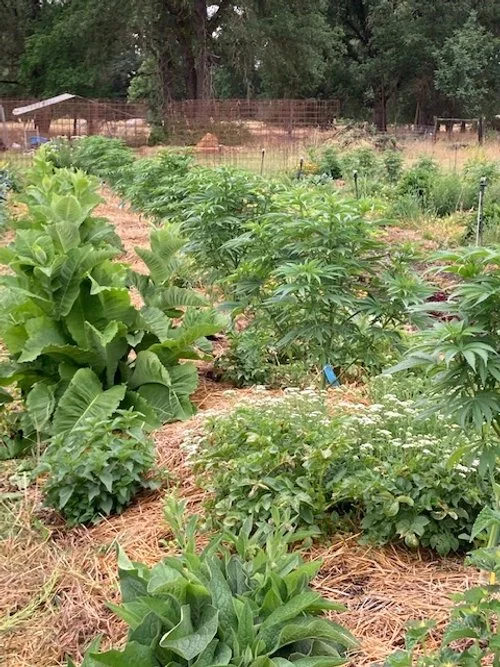
The Certified Sun Grown Collective (CSGC) champions the integration of cannabis production with food systems, modeling regenerative economic-agricultural systems that prioritize community resiliency, local supply chains, and ethical business practices. CSGC provides the resources necessary to support farmers and cultivators committed to advancing these values. By supporting CSGC-certified products, consumers become part of a movement dedicated to ethical cultivation, community impact, and environmental stewardship.
PLEASE FOLLOW THIS LINK TO COMPLETE OUR ONBOARDING FORM
Guiding Principles and Practices
1. Sun-Grown Crops- All crops are cultivated under natural sunlight in soil, with artificial light being utilized solely for the propagation of seedlings.
2. Soil Health Improvement and Soil Health Metrics- Members commit to demonstrating year-over-year improvements in soil organic matter, actively enhancing the health and fertility of the soil. Members will regularly measure and report on soil organic matter as a key indicator of soil health.
3. Biodiversity-Members implement crop rotations and polycultures, including the use of cover crops and vegetable production, to enhance biodiversity and promote a resilient ecosystem.
4. Water Management- Members employ water conservation techniques such as drip irrigation and rainwater harvesting to minimize water use and preserve natural resources.
5. Organic and Plant-Based Inputs- No synthetic pesticides or fertilizers are used in the cultivation process. Members exclusively use organic or plant-based alternatives and affirm that no synthetic materials have been applied within the last three years.
6. Carbon Footprint Reduction- Members actively implement strategies to reduce their carbon footprint and increase carbon sequestration, contributing to climate change mitigation efforts. These efforts will be documented in a formalized assessment.
7. Education and Outreach- Members are committed to educating themselves, fellow members, and the public about regenerative organic cannabis and food production, promoting broader awareness and adoption of these principles.
8. Local Engagement - Members actively engage in local community projects or partnerships with local organizations, demonstrating a commitment to supporting and enriching their communities.
9. Cultivation of Organic Food and Support for Food At-Risk Populations- Members maintain active programs to distribute a portion of their organic produce to local food banks or directly to at-risk communities, ensuring that vulnerable populations have access to nutritious food. Further, At least 20%, at a minimum, of each member’s cultivation space is dedicated to regenerative organic food production, supporting food security and local food systems.
10. Distribution Networks - Members establish and maintain partnerships with local food banks or non-profit organizations to facilitate the distribution of organic food produce to those in need.
CSGC and Sun and Earth Certification
Certified Sun Grown Collective (CSGC) Certification Program: A Two-Year Transition Framework
Year 1: Self-Assessment, Corrective Actions, and Attestation
Objective: Prepare growers for certification by guiding them through standards, identifying areas for improvement, and implementing necessary changes while gaining access to CSGC branding and marketing benefits.
Key Steps:
Attestation of Practices
Timeline: Upon joining the program.
Action: Growers submit an attestation of current practices, including signed documentation, a farm plan, and detailed farm practices.
Review: Documents are assessed by the CSGC certification team, with feedback provided by a certification advisor.
Self-Assessment
Timeline: First 3 months.
Action: Growers complete a detailed assessment covering soil health, water usage, pest management, and labor practices.
Outcome: Approved self-assessments allow growers to use the CSGC logo and branding. If deemed ready, growers may proceed to third-party certification by Sun+Earth through an onsite inspection in Year 1.
Corrective Actions
Timeline: 3 months to identify non-conformities; up to 6 months for resolution.
Action: Develop and implement a corrective action plan with specific goals and timelines, supported by consultants or peers.
Monitoring: Monthly progress reviews ensure compliance and readiness for Year 2 certification.
Year 2: On-Site Certification and Final Certification
Objective: Verify compliance through rigorous on-site inspections and award final certification to growers meeting all program standards.
Key Steps:
Preparation for Inspection
Timeline: Months 1-3.
Action: Ensure all practices are implemented and documented, using pre-certification checklists and mock inspections.
On-Site Certification Inspection
Timeline: Months 4-6, during the production season.
Action: A third-party inspection by Sun+Earth Certified reviews records, practices, and farm operations.
Components: Soil and water testing, labor practices, pest management, and traceability audits.
Addressing Non-Compliance
Timeline: 1-3 months.
Action: Develop remediation plans and undergo follow-up inspections if necessary.
Final Certification
Timeline: Months 10-12.
Action: Certification is awarded upon verification of compliance, granting growers access to CSGC and Sun+Earth marketing, POS materials, and public recognition.
Ongoing Requirements Post-Certification
Annual Review: Desk audits or on-site inspections to maintain certification.
Continuous Improvement: Participation in educational programs to advance regenerative cannabis cultivation practices.

